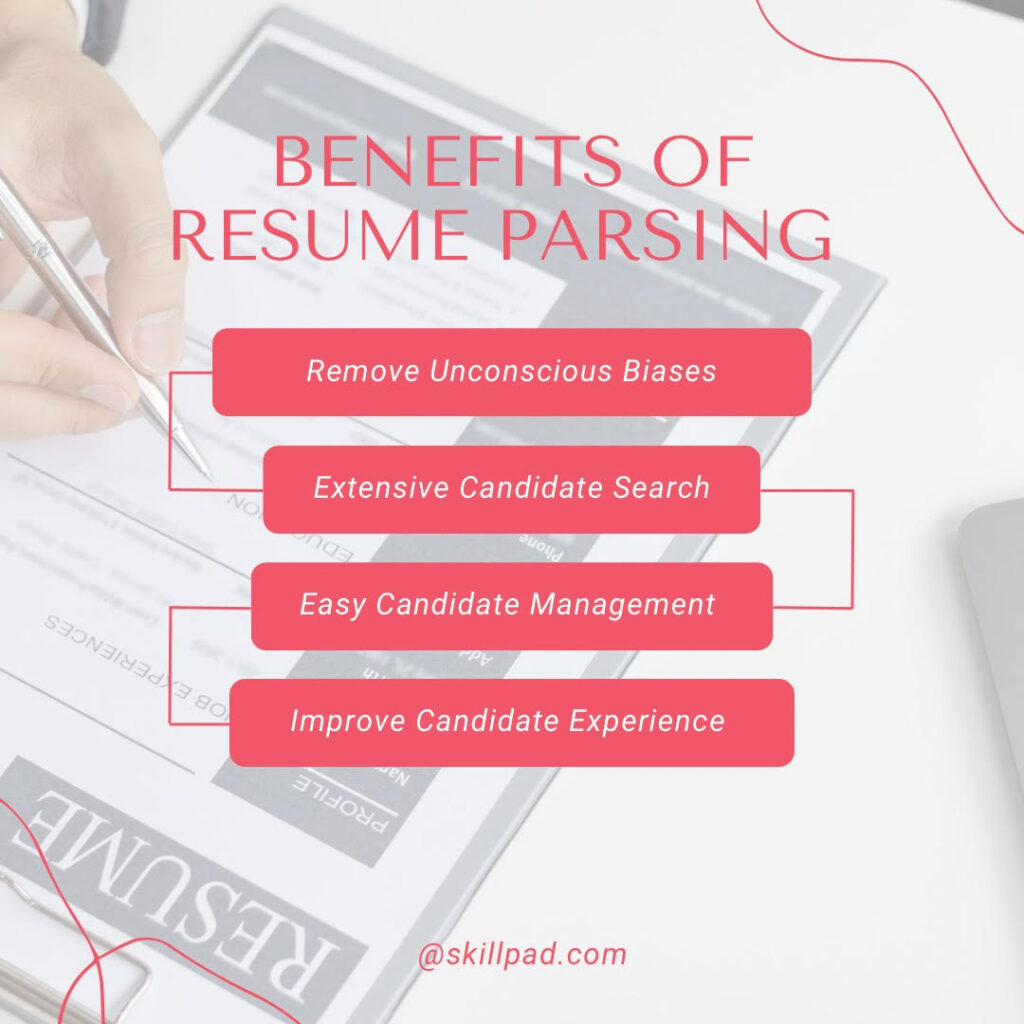On average, a corporate job opening receives 250 applications. As a result, screening, shortlisting, and inviting job applicants to the next step can overwhelm a recruitment workflow.
Recruiters have to spend long hours screening each application, which they could have used to create new recruitment strategies. According to the latest recruitment analytics, recruiters spend 23 hours screening candidates for a job.
But thanks to technology that can read resumes, you can quickly add skilled and qualified applicants to your recruitment funnel.
Resume parsing is a useful tool for sifting through a lot of job applications to find the best ones. Let’s understand this technology in detail.
What is Resume Parsing?
Resume parsing is an automatic way to store and look at job applications for a specific position. AI technology is used by resume parsing software to look for certain keywords in a resume document and choose the right job applications.
This software makes it easy for recruiters to select ideal candidates from a large pool of applications. In addition, resume parsers make the business recruitment workflow faster and more accurate.
Why Must You Use Resume Parsing?
No matter how effective a job description you write, you are bound to get some irrelevant job applicants. You will get applicants who do not match your job’s skills and qualifications. Sometimes you will also receive applications with a good skill set, but you aren’t hiring those candidates now.
In these situations, resume parsing can get rid of all the useless applications so that your hiring team can focus on the good ones. Besides saving your time, this recruitment technology can help with the following:

Remove Unconscious Biases
When a recruiter screens a resume, they look for specific points to build contact between themselves and the candidate. There is a chance of unconscious bias here. A resume parser can help ensure no bias is involved during recruitment.
Extensive Candidate Search
ATS (Application Tracking Software) and a resume parser can help you find candidates more quickly. An ATS includes tools for conducting a thorough search for the candidates you seek. A resume parser, for example, can help you find keywords, while an applicant tracking system keeps track of resumes and gives them scores based on how relevant they are.
Easy Candidate Management
Using a resume parser, managing large candidates gets easier. Recruiters can filter candidates based on keywords, tags, and years of experience. These filters make it easier to find your ideal candidate.
Improve Candidate Experience
Recruiters struggle to provide an excellent candidate experience when they have bulk applications to sort out. They can’t answer every candidate’s question and keep them up to date on the whole hiring process. It can cause poor candidate experience.
Recruiters no longer need to spend time screening candidates because of resume parsing solutions. Instead, they can use that free time to try new recruitment strategies to improve the candidate experience.
How Does Resume Parsing Work?
The first step in resume parsing is putting all of the applications for a certain job into the program that does the parsing. Then, based on what a recruiter wants, the program goes through each application and pulls out all the relevant ones.
The relevant data consists of things like particular job skills, work history, contact details, educational credentials, professional certifications, etc.
The resume parsing software can save the time of hiring managers. It can find the applications with relevant information and group them together, or it can get rid of candidates who don’t have it.
What Are the Challenges of Resume Parsing?
Resume parsing programs have made it easy to screen potential candidates. The tools help to save time, streamline recruitment workflow and get a candidate their first job faster.
Even though there are many benefits, recruiters have to deal with some problems when parsing resumes getting the results they want. Here are some challenges associated with resume parsing –
Language Barriers
When it comes to resume parsing, language is always a challenge. Based on a given input, AI algorithms scan specific words in resumes to shortlist the best candidates.
Certain words have different meanings depending on the context. This makes it difficult for the parser to produce accurate results.
Suppose you set a parser to shortlist candidates with copywriting skills. But, some candidates have used content writing instead of copywriting. As a result, you might lose a good candidate.
No Specific Date Format
The format for writing dates is not specified. As a result, all resume parsers can’t interpret the data in a different format.
Plus, people use different date formats worldwide. For example, Americans use the MM/DD/YY date format. But, in contrast, Asians go for the DD/MM/YY format.
A wrongly set date format can limit your resume prayer, leading to a potential candidate loss.
No Scores for Creativity
Resume parsers are data-driven tools. They work based on the data you feed them. These tools don’t consider emotions or passion.
Some candidates might use graphics and visuals to showcase their skills. But, unfortunately, parsers aren’t programmed to consider such creative efforts.
Resume parsers only recognize text elements like font style, rows, character spacing, etc. Therefore, if a resume isn’t formatted to meet parser guidelines, it can’t identify candidates.
Candidates Can Manipulate Parsers
Candidates can sometimes fool the resume parser into giving their resumes a higher score. There is a chance that the candidates will use keyword stuffing to make their resumes stand out. It implies that the resume parser is not always error-free.
Technical Knowledge
There are no coding skills required to use the resume parser. But, recruiters must still have adequate training to use these tools, like what data to give, how to use a tool, etc.
Top Rated Resume Parsing Tools
You can overcome resume parsing challenges with the right tools. For example, a good resume parsing software can identify keyword variations, font styles, etc.
Here are the best resume-parsing tools:
Rchilli
Rchilli is a leading resume parsing, matching, and data enrichment tool. The software uses NLP-based AI technology to parse resumes of any format. It supports various formats like doc, DOCX, RTF, HTML, etc.
Key Features
- Predictive analytics
- Data extraction
- Multiple language support
- Contact management
HireEZ
HireEZ is a perfect tool to maximize your recruiters’ productivity. It can find and engage suitable candidates faster. The HireEZ AI database has over 30 platforms and 700 million professional profiles listed. It helps to engage candidates with AI prioritization and instant contact details.
Key Features
- Resume parsing
- Self-service portal
- CRM
- Candidate management
- Performance management
- Recruitment management
Bullhorn
Bullhorn is a complete ATS and CRM software for staffing and recruiting solutions. Over 10,000 recruitment departments use this platform to boost sales, streamline tasks, and gain a competitive edge.
Key Features
- Job posting
- Candidate tracking
- Onboarding
- Recruitment workflow management
- Pipeline management
- Resume parsing
Zoho Recruit
Zoho Recruit is a system for keeping track of qualified applicants and moving them through the recruitment funnel. It helps to organize and track your job openings, resumes, contacts, and candidates. Your talent pipeline can be optimized with AI, analytics, and custom automation.
Key Features
- Background Screening
- Social recruiting
- Candidate tracking
- Career page
- Resume search
- Resume parsing
- Assessment management
Quick Tips to Work With Resume Parsing Software
- Make sure your name is included in the filename of your resume.
- To ensure maximum parsing compatibility, submit your resume in.docx format.
- If you want to use a pdf, export it from MS Word.doc. NEVER SCAN A PDF AS AN IMAGE.
- Avoid using headers and footers.
- Throughout the document, use a single standard font.
- Avoid using tables and columns.
- Avoid using WordArt.
- Don’t fiddle with the spacing.
Parting Note
Resume parsing can bring ease to your recruitment funnel. You can quickly find the best candidates for a job role. But resume parsing has some challenges that you can’t ignore.
If you find it hard to work with a resume parser, SkillPad can help you. In addition, we provide personalized recruiting services to businesses. Our team can understand your recruitment needs and connect you with the best candidates.
Get in touch to find out more now!












